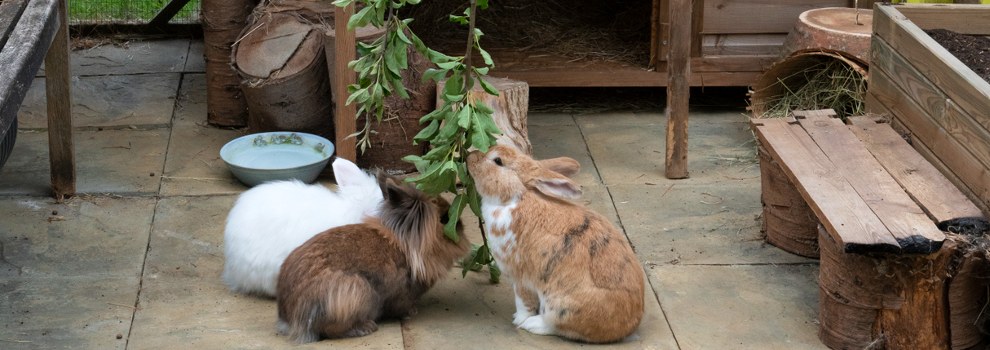What is enrichment
‘Enrichment’ refers to the way you set up your pet’s spaces and the objects you give them. This can include hiding places and shade, platforms, toys and the way you give them their food. It can also include giving them company, such as other rabbits or people. The aim is to help your rabbits carry out more of their natural behaviours, more often. They’ll be much happier and healthier that way.
Why is enrichment important?
Rabbits are intelligent, active, social and inquisitive animals. So freedom to explore, exercise, forage and socialise is vital to your pets' health and wellbeing. They also need to be able to feel safe, to be protected from predators and extreme weather conditions, and to have the opportunity to be alone when they choose.
The size of their enclosure is very important, of course, but what’s in the enclosure is just as important. Interesting environments give your rabbits opportunities to perform normal behaviours, such as exploring, digging, hopping and foraging, and the chance to play and socialise with other friendly rabbits and people.
What happens if pet rabbits don’t have enough enrichment?
If your rabbits live in a ‘barren’ (small, bare and plain) environment, they can become bored, frustrated and even depressed. Signs of an unhappy rabbit can include a hunched posture, not moving much, an unhealthy coat, dull eyes and tummy problems. Repetitive behaviours, such as chewing at their fur, biting at water bottles or other items, and circling on the spot are also signs of unhappiness. It’s good to take them to a vet to rule out illness. But also take a good look at their home and see what you can do to help them.
Making your rabbit's home more interesting for them
Rabbits need a large, secure enclosure (a run or pen) with a big floor area and a high ceiling – this means they’ll be able to run, jump, hop, and rear up on their hind legs. They also need enough room to lie fully outstretched.
The enclosure needs to be attached to a large shelter, so the rabbits can choose to be inside or outside at any time, day or night, and have more space. We have more advice about what makes good rabbit housing.
Enrichment could include hiding places, platforms, and toys and objects to interact with. You can also enrich your rabbit’s diet (avoiding stomach problems) and the way you feed them. Puzzle feeders, for example, can simply be an empty toilet paper tube or cardboard box stuffed with hay. This lets the rabbits forage in a 'natural' way.
Here are some things to bear in mind when looking at your rabbits’ environment and enrichment.
- Keep a close eye on your rabbits when first giving them a new item in case it makes them stressed or frightened. Introduce new items for short periods, watch your rabbits' behaviour, and remove the item if needs be.
- Ensure rabbits can move away and/or hide from new items and retreat from social contact with other friendly rabbits or people if they choose to.
- If you have a number of rabbits, make sure there are enough items for each animal, so they don’t need to compete for them.
- Regularly rotate toys and objects to keep your rabbits interested.
- Rabbits need a predictable routine. If they’re used to being given a toy or object at the same time each day, keep up this routine to avoid stressing them.
- Don't fill your rabbits' spaces with so many items they don’t have space to exercise easily. Rabbits need to run, jump, stand fully upright on their back legs and hop about, so enrichment should encourage this behaviour and not stop it.
- Be careful with fabrics. Towels, blankets, 'vetbeds', rugs or carpets can harm your rabbits if they eat them, so only give them to your rabbits if you’ll be supervising them the whole time.




